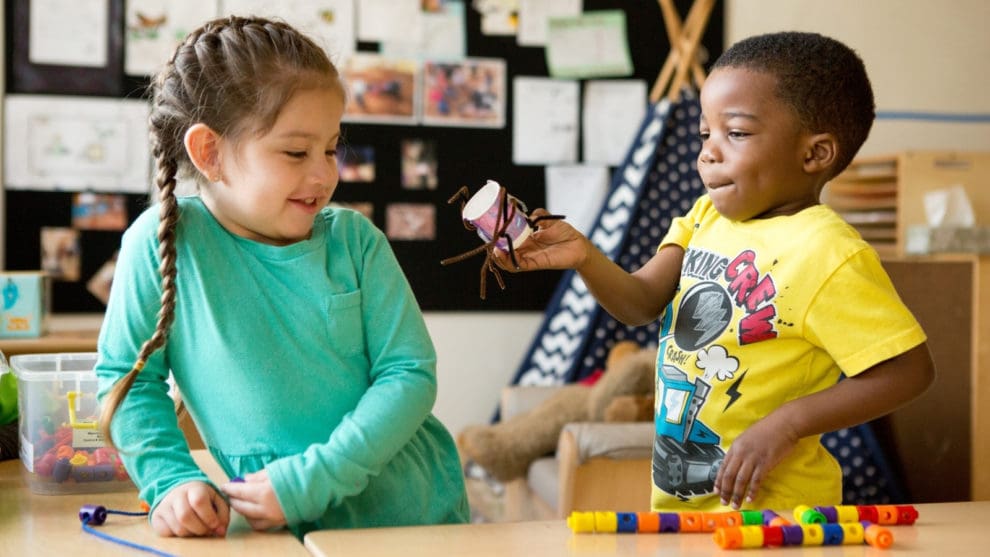
Once our children celebrate their 5th birthday, they are welcomed into a public school system that can provide valuable benefits to them and their families.
But children younger than 5 — who have at least as many needs — get no such assurance of care and education. They are left largely without a public policy solution that meets their developmental demands, with lower-income children and children of color hit hardest. The United States invests fewer public dollars in early childhood education and care relative to Gross Domestic Product (GDP) than almost all other developed nations, according to a recently released report from the U.S. Department of the Treasury, ranking 35th out of 37 countries tracked by the Organization for Economic Cooperation and Development.
Yet each of us, whether we have children or not, has a stake in the success of child care in this country. Combining high-quality, access, affordability, and a well-supported workforce will allow our early learning system to provide the care, education, and economic stability the nation needs for the success of our children and our national economy.
Congress currently has an opportunity to meet this challenge – its first opportunity in 50 years. We must not lose this chance. Strong investments in early learning must remain in the reconciliation package currently moving on Capitol Hill.
Income and Access
Our current child care system is out of reach for many American families and strains the resources even of those who can manage to pay for it.
Families across the income spectrum had low access to low-priced care, according to a 2021 study from the U.S. Department of Health and Human Services (HHS), and families with infants and toddlers had particularly low access. Free infant and toddler care also was generally unavailable, while families with preschool-aged children, particularly low-income families, had higher, but still low, access to free child care.
The infant and toddler stage is a critical time in children’s lives and lack of early childhood opportunities can impact their long-term development. Lack of access continues into the pre-K years with more than 3 million 3- and 4-year-olds still not in pre-K and children from the highest income group continuing to be more likely to attend preschool than children from lower-income groups.
Congress funds the Child Care and Development Fund (CCDF) which offers states grants to allocate subsidies for child care to low-income families. Yet in many states, the income cut-off for eligibility leaves many low- to moderate-income families outside the subsidy system. In addition, HHS estimates that only 15% of all children eligible for subsidies under federal rules actually received CCDF assistance. States have also continued to under-invest in pre-K. In 2020, only five states spent enough to guarantee high-quality, full-day pre-K for 3- and 4-year-old children with the majority of the country still not providing universal access, and six states providing no state funding at all for early childhood programs.
Benefits of Early Childhood Education
Research continues to reinforce that early access to child care and pre-K creates positive, on-time, post-secondary educational outcomes for children. The Centers for Disease Control and Prevention (CDC) finds that early childhood education improves children’s cognitive development, emotional development, and academic achievement. These early development and academic improvements can have a positive effect on success and career outcomes much later in life.
Opportunity for Change
President Biden has made universal child care and pre-K a cornerstone of his “Build Back Better” agenda and Congress is currently working to include these provisions in a large reconciliation spending package. The president’s proposal would include $450 billion in new early learning funding, including for child care in states to support parents, child care providers, and child care workers; funding for physical child care infrastructure; and new universal pre-K partnerships with states to expand early learning programs. These federal investments provide a clear pathway for many children to reach their full potential and demonstrate that the United States has a commitment to the development and well-being of children.
President Biden’s child care plan proposes funds to states to limit most families’ out-of-pocket child care expenses to 7% of their income (the level that the Administration on Children and Families has deemed affordable). For families that meet or are below the state median income, the plan would fully cover the cost of child care through 2024. The plan requires that states must accommodate low-income infants and toddlers, infants and toddlers in underserved areas, infants and toddlers with disabilities, and dual-language learners. The plan also includes state infrastructure grants that improve child care safety and ensure attention to quality. These grants aim to make sure that every child care facility in the United States meets or surpasses state health and safety standards.
President Biden’s universal pre-K plan similarly incentivizes states to use federal funds to implement federally approved, universal pre-K programs that give parents choices in the setting that works best for their children and families. Those settings can include public schools, child care providers of all kinds, and Head Start programs. For the Fiscal Years 2022, 2023 and 2024, the plan would fund 100% of the program’s costs. Following 2024, the funds would depreciate by 10% annually until the program is up for renewal in 2028. To receive these federal funds, states will have to ensure that they have a thorough proposal that tracks quality improvement, provides outreach to families with special attention to underserved populations, supports the careers and educational aspirations of staff, and provides transportation for students.
These federal requirements will allow states to create programs that best support their children and families and will provide the first opportunity for many underserved children to attend an early learning program. The requirements also take into special consideration the needs of children who are experiencing homelessness and children with disabilities, two key groups of children often failed by the early childhood education system.
These provisions lay a strong foundation for universal access to early learning, and they are critical for children’s development and well-being, for families to have the ability to afford high-quality care and to work or attend school, for early learning professionals to earn a living wage and have opportunities for professional development, for employers and our economy to have a stable workforce, and for equity in our country. Strong investments in early learning must remain in the reconciliation package. In the coming weeks, the debate will continue about whether these programs will make it to the president’s desk. The last major child care bill passed Congress with bipartisan support 50 years ago. President Nixon ultimately vetoed that measure. Our children cannot afford to wait another 50 years.
